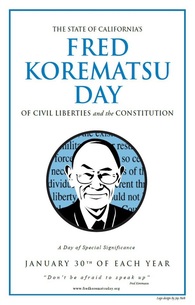 Fred Korematsu was one of the many Japanese-Americans living on the West Coast during World War II. Born in Oakland, California to Japanese immigrants, Korematsu attended public schools, participated in sports, and worked in his family's plant nursery. Still, he faced discrimination because of his ancestry. Restaurants refused to serve him, barbers wouldn't cut his hair, and the US military classified him as a "enemy alien" even though he was an American citizen. Things just got worse following the Japanese attack on Pearl Harbor in December 1941. Four months later, Korematsu's family was sent to Tanforan Racetrack where they awaited transfer to an internment camp. Korematsu refused to go. He was, after all, an American citizen, and didn't think the "government would go as far as to include American citizens to be interned without a hearing," he later recalled. However in May 1942, Korematsu was arrested. He was found guilty of violating military orders and sent toTanforan to await internment. With the help of the Northern California ACLU, Korematsu appealed his case to the U.S. Supreme Court - and lost in a 6 to 3 decision - in 1944. The government argued his internment was not based on racism and that the Army had proof that Japanese residents were signaling enemy ships and prone to disloyalty. Four decades later, his conviction was invalidated by a federal judge on factual grounds. Research had uncovered Justice Department documents stating that the government’s evidence contained “intentional falsehoods” about the security threat. In 1998, Korematsu was awarded the Presidential Medal of Freedom. To learn more about Fred Korematsu & civil liberties in a time of war, try the following resources:
All of my posts on World War II can be found here.
0 Comments
Your comment will be posted after it is approved.
Leave a Reply. |
